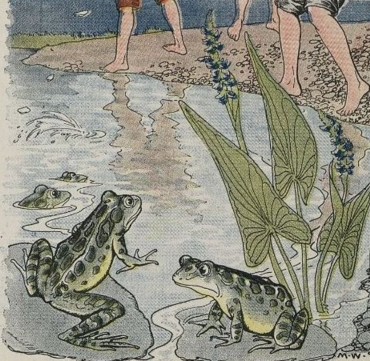PART A_1
Let’s learn vocabulary. Listen and repeat the words and the sentences with your tutor.
PART A_2
| 1. pond | /pond/ |
| -a body of water smaller than a lake, sometimes artificially formed, as by damming a stream. | |
| They found a couple of water lilies on the pond. | |
| 2. skip | /skip/ |
| -to move in a light, springy manner | |
| The little boy skipped on his way to the ice cream shop. | |
| 3. tremble | /TREM-buhl/ |
| -to shake involuntarily with quick, short movements, as from fear, excitement, weakness, or cold; quake; quiver. | |
| The mouse trembled with fear when the big cat crossed the room. | |
| 4. dear | /deer/ |
| -beloved or loved: | |
| She invited her dear friends to her birthday party. | |
| 5. unhappiness | /uhn-HA-pee-nuhs/ |
| -the feeling of not being happy; sadness. | |
| Remembering her past traumatic experiences causes her so much unhappiness. |
PART B_1
Let’s read the story. Please read them aloud, and I will check your pronunciation and intonation.
PART B_2
THE BOYS AND THE FROGS

Some Boys were playing one day at the edge of a pond in which lived a family of Frogs. The Boys amused themselves by throwing stones into the pond so as to make them skip on top of the water.
The stones were flying thick and fast and the Boys were enjoying themselves very much; but the poor Frogs in the pond were trembling with fear.
At last one of the Frogs, the oldest and bravest, put his head out of the water, and said, “Oh, please, dear children, stop your cruel play! Though it may be fun for you, it means death to us!”
Always stop to think whether your fun may not be the cause of another’s unhappiness.
PART C_1
Let’s answer comprehension questions. Please answer them based on the story.
PART C_2
| 1. | What did the boys do to entertain themselves? |
| 2. | How did the Frog feel about it? |
| 3. | What did the oldest and bravest frog tell the boys? |
PART D_1
Let’s discuss the story. Please answer the questions below and express your opinions.
PART D_2
| 1. | How would you describe the boys in the fable? |
| 2. | Why do you think the boys choose that activity? |
| 3. | Do you think the boys stopped playing when they learned their game scared the frogs? Please explain. |
| 4. | The fable’s lesson is “Always stop to think whether your fun may not be the cause of another’s unhappiness.” Do you agree with this? Why or why not? |
| 5. | How do you deal with insensitive individuals? |
REVIEW AND FEEDBACK
Now, let us review the things that you learned in this lesson.
ではこのレッスンで学んだことを振り返りましょう。
(Please give a short feedback on how your student did on your class.)
| Grammar 文法 |
Pronunciation 発音 | Vocabulary 単語 |
Comprehension 理解 |
|
|---|---|---|---|---|
 GOOD GOOD |
文法の誤りはほとんどなく、完全な文章で話すことができる | ほとんどの単語をはっきりと正しく発音することができる | 習った表現を適切に使うことができる | 文章を理解し、質問に正しく答えることができる |
 FAIR |
文法の誤りはあるが、完全な文章で話すことができる | 発音の練習が必要な言葉がいくつかある | たまにミスはあるが、習った表現を適切に使うことができる | 文章を完全に理解するのは難しく、質問に正しく答えられないときもある |
 POOR |
文章で話すのは難しく、単語だけで話すことができる | 発音の練習が必要である | 習った単語と表現を少しだけ使うことができる | 文章を理解するのは難しく、質問に答えるのは難しい |
Parts of this lesson material are based on:
An eBook from The Project Gutenberg.
This eBook is for the use of anyone anywhere at no cost and with almost no restrictions whatsoever. You may copy it, give it away or re-use it under the terms of the Project Gutenberg License included with this eBook or online at www.gutenberg.org
An eBook from The Project Gutenberg.
This eBook is for the use of anyone anywhere at no cost and with almost no restrictions whatsoever. You may copy it, give it away or re-use it under the terms of the Project Gutenberg License included with this eBook or online at www.gutenberg.org